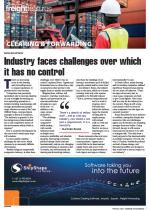African countries south of the equator have largely dematerialised border clearance paperwork – and are ahead of the global average.According to a list provided by DHL, around 66% of the 235 countries have paperless systems for inbound freight.For the 18 African countries on or below the equator (including Somalia), the percentage is 88%.Outbound, 38% of countries globally have no paperless systems, with the sub-equator share being 33%.The list includes countries with limits on paperless imports and exports – 13% have restrictions on imports and 38% on exports.None of the sub-Saharan countries have such regulations.Only two countries – Lesotho and Somalia – have not dematerialised their border red tape.Uganda, Rwanda, Burundi, Zimbabwe and Swaziland require physical paper for exports, but not imports.Globally, the countries with restrictions on the value of paperless exports are mainly in South America. They range from $200 for Uruguay to $5 000 for Ecuador.Inbound limits range from $25 for Martinique to $13 623 for the United Arab Emirates.Asian countries are formalising the dematerialisation of border documentation through the formation of the Paperless Trade Council of the Framework Agreement on Facilitation of Cross-border Paperless Trade in Asia and the Pacific.The first meeting – which was by invitation only – was held at the United Nations Conference Centre in Bangkok from April 27-29, 2022.According to the announcement of the meeting by the World Trade Organization, “the benefits of trade digitalisation are evident, but its implementation may be challenging.“Policy decisions require legal and technical action to allow the transition to cross-border paperless trade systems.”A “Cross-border Paperless Trade Toolkit,” aimed at raising awareness of the technical and legal tools that may be used to make the transition to paperless trade, has been published in support of the transition.A natural progression from dematerialised trade is doing away with physical cash altogether.According to research published by Merchant Marine, the countries closest to becoming cashless societies are Norway, Finland and New Zealand, followed by Hong Kong, Sweden, Denmark, Switzerland, the UK, Singapore and the Netherlands.In all 10 countries cash is used in less than 5% of payments.

